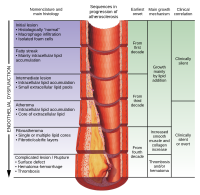
Photo from wikipedia
Tea has long been valued for its health benefits, especially its potential to prevent and treat atherosclerosis (AS). Abnormal lipid metabolism and oxidative stress are major factors that contribute to… Click to show full abstract
Tea has long been valued for its health benefits, especially its potential to prevent and treat atherosclerosis (AS). Abnormal lipid metabolism and oxidative stress are major factors that contribute to the development of AS. Tea, which originated in China, is believed to help prevent AS. Research has shown that tea is rich in catechins, which is considered a potential source of natural antioxidants. Catechins are the most abundant antioxidants in green tea, and are considered to be the main compound responsible for tea’s antioxidant activity. The antioxidant properties of catechins are largely dependent on the structure of molecules, and the number and location of hydroxyl groups or their substituents. As an exogenous antioxidant, catechins can effectively eliminate lipid peroxidation products. They can also play an antioxidant role indirectly by activating the endogenous antioxidant system by regulating enzyme activity and signaling pathways. In this review, we summarized the preventive effect of catechin in AS, and emphasized that improving the antioxidant effect and lipid metabolism disorders of catechins is the key to managing AS.
Journal Title: Frontiers in Pharmacology
Year Published: 2023
Link to full text (if available)
Share on Social Media: Sign Up to like & get
recommendations!